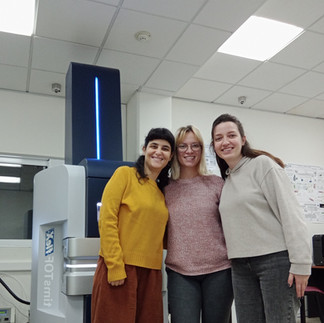Aleksandra Stanojević’s Secondment from IORS to NKUA
- EXPAND-EV
- Mar 4
- 1 min read
Updated: Mar 27
As part of the EXPAND-EV project, Aleksandra Stanojević recently completed her secondment from the Institute of Oncology and Radiology of Serbia (IORS) to the National and Kapodistrian University of Athens (NKUA). This exchange aimed to enhance her expertise in proteomics, with a particular focus on extracellular vesicle (EV) analysis.
The secondment provided Aleksandra with hands-on training in proteomic workflows, covering everything from sample preparation techniques to data analysis and visualization. These methodologies are essential for the future study of extracellular vesicles, a key aspect of the EXPAND-EV project. Through this training, she acquired the necessary skills to analyze liquid biopsy samples, ensuring a comprehensive understanding of the entire process—from initial sample processing to complex data interpretation.
Beyond technical training, Aleksandra's time at NKUA fostered valuable collaborations. She worked closely with NKUA lab members, exchanging knowledge and discussing potential future projects in proteomics analysis. This collaboration extends beyond the scope of this secondment, paving the way for ongoing joint research initiatives.
A significant outcome of this visit was Aleksandra’s engagement with bioinformatics approaches to data analysis. She explored various analytical methods and machine learning models that align with the broader aims of the EXPAND-EV project. These computational techniques offer new opportunities for interpreting proteomic data, contributing to more precise and meaningful insights into EV protein characterization.
This secondment directly supports the goals of Task 3.2, "Identification of Cell-Pathology Appropriate Cell Models" within WP3, which focuses on characterizing EV proteins using liquid chromatography-mass spectrometry (LC-MS). Additionally, the exchange facilitated knowledge-sharing as outlined in WP2, reinforcing the project's commitment to skill development among seconded researchers.









Comments